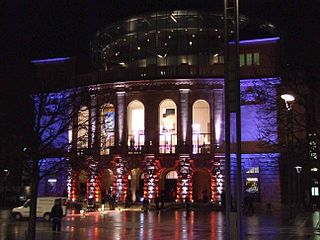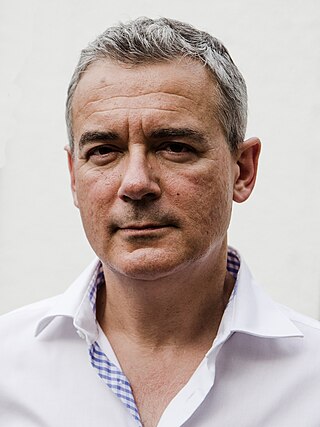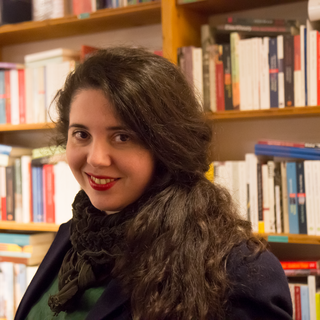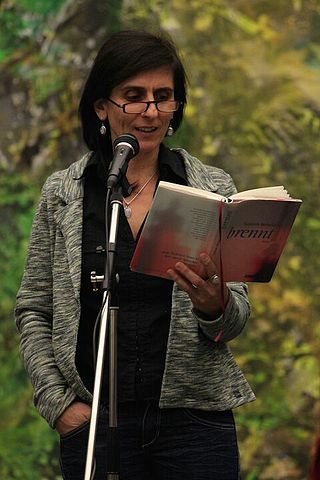Related Research Articles
Harald Weinrich was a German classical scholar, scholar of Romance philology and philosopher, known for the breadth of his writings.
The Hanseatic Goethe Prize was a German literary and artistic award, given biennially from 1949 to 2005 to a figure of European stature. The prize money was €25,000. On the occasion of Goethe's 200th birthday, the Freiherr vom Stein Foundation in Hamburg endowed a cultural prize "for important personalities in the intellectual life". The prize was awarded by the foundation of the Hamburg businessman Alfred Toepfer, Alfred Toepfer Foundation F. V. S..

The Robert Bosch Stiftung GmbH is a German foundation that owns a majority shareholding in Robert Bosch GmbH, from which it derives its funding. The foundation was established in accordance with the wishes of Robert Bosch, who died in 1942, and conducts and finances social, cultural and scientific projects.

The Carl Zuckmayer Medal is a literary prize given by the state of Rhineland-Palatinate in memory of Carl Zuckmayer. The medal itself was fashioned by state artist Otto Kallenbach. The prize is also given with a 30 liter cask of Nackenheimer wine from region Gunderlock, a type valued by Zuckmayer. The bestowal takes place on 18 January, the anniversary of Zuckmayer's death.

Ilija Trojanow is a Bulgarian–German writer, translator and publisher.

Ota Filip was a Czech novelist and journalist. He wrote in both German and Czech.

Olga Martynova is a Russian-German writer. She writes poems in Russian, and prose and essays in German.
The Leipzig Book Fair Prize is a literary award assigned annually during the Leipzig Book Fair to outstanding newly released literary works in the categories "Fiction", "Non-fiction" and "Translation". The Leipzig Book Fair Prize has been awarded since the Deutscher Bücherpreis was ceased in 2005, and is one of the most important literary awards in Germany. The winner in each category is awarded €15,000.

Terézia Mora is a Hungarian writer, screenwriter and translator.
Friedrich-Märker-Preis was a Bavarian prize given to essayists. It was named after the essayist Friedrich Märker.
Thaddäus-Troll-Preis is a literary prize awarded by the Förderkreis deutscher Schriftsteller in Baden-Württemberg, an organization that supports and sponsors writers in the German state of Baden-Württemberg. The prize is awarded annually to German-language writers resident in the state and is named in honor of Thaddäus Troll, one of the founders of the organization. The prize money is €10,000.

Bayerische Akademie der Schönen Künste in München is an association of renowned personalities in Munich, Bavaria. It was founded by the Free State of Bavaria in 1948, continuing a tradition established in 1808 by the Royal Academy of Arts in Munich.
The Hermann-Hesse-Literaturpreis is a literary prize of Germany in honour of German-born Swiss writer, poet and Nobel Prize winner Hermann Hesse.
Preis der Literaturhäuser is a German literary prize. Since 2002, it has been awarded to German authors annually by the Netzwerk der Literaturhäuser during the Leipziger Buchmesse for exceptional text and presentation skills. The prize contains a journey through the eleven Literaturhäuser in Germany with a cost of €11,000 as well as a eulogy in honor of the author in all eleven Literaturhäuser.
Würth-Preis für Europäische Literatur is a biennial German literary award given to an author. The prize is €25,000 and is open to any European authors. It is one of a series of awards given by the Würth Foundation in Künzelsau, a cultural organization supported by the Würth Group. The prize has been awarded since 1998, for "literary efforts for the cultural diversity of Europe".

Zehra Çırak is a Turkish-German writer.

Marjana Michailowna Gaponenko is a German writer born in Odesa, Ukraine.

Sudabeh Mohafez born 1963 in Tehran, Imperial State of Iran is a German author.

Anila Wilms is an Albanian writer living in Germany.

Abbas Khadir is a German author and poet of Iraqi origin. He was imprisoned for his political activism against the regime of Saddam Hussein, and took refuge in a number of countries before he was granted asylum in Germany, namely Berlin, in 2000, where he continues to live. He is mostly known for his four novels, "The Village Indian,” “The President's Oranges,” “Letter to the Aubergine Republic” and “A Slap in the Face,” to which he received several literary prizes and scholarships, including, most recently, the Adelbert von Chamisso Prize.
References
- 1 2 Göktürk, Deniz; Gramling, David; Kaes, Anton (2007). Germany in Transit: Nation and Migration, 1955–2005. Weimar and Now: German Cultura. p. 390.
- 1 2 3 4 "About the Chamisso Prize". Robert Bosch Stiftung. Archived from the original on 2 October 2016. Retrieved 29 September 2016.
- ↑ Trojanow, Ilija; Oliver, José F. A. (21 September 2016). "Ade, Chamisso-Preis?". Frankfurter Allgemeine Zeitung (in German). Retrieved 29 September 2016.
- 1 2 "The Prizewinners by year". Robert Bosch Stiftung. Archived from the original on 19 January 2015. Retrieved 29 September 2016.
- ↑ "Honorary Award of the Adelbert von Chamisso Prize". Robert Bosch Stiftung. Archived from the original on 2 October 2016. Retrieved 29 September 2016.